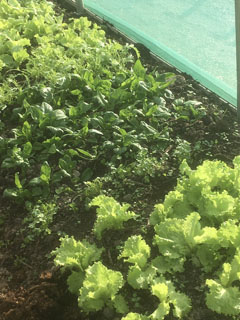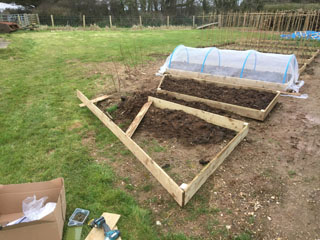 So here we are. Still in lockdown, hopefully safe and well, but rather confused and dazed. As the weeks pass, there is maybe a little less of the “flat spin” about us, and a bit more of the “so how do we respond to this?” instead.
So here we are. Still in lockdown, hopefully safe and well, but rather confused and dazed. As the weeks pass, there is maybe a little less of the “flat spin” about us, and a bit more of the “so how do we respond to this?” instead.
Many of you on the Roseland, and countrywide, are responding by wanting to grow more of you own. With all of us less able and less willing to go to the shops, we are going as local as we can, and for many us that means turning whatever outdoor space we have into a productive area. It is an impossibly broad subject to cover in one column, but here are a few pointers that might help you focus on how you might approach such a project.
Digging down or raising up?
This is the first question you need to ask yourself. We are great fans of the “no dig” raised bed approach to vegetable and flower gardening. It is the most easily manageable style of planting bed to manage in the short and long term, and the quickest to get going. The raised bed approach requires you to build a small wooden frame, then fill it with soil, compost, well-rotted manure – any good growing medium you can lay your hands on. Then plant. Easy peasy.
However, we realise that much of this may not be easily available at the moment, although many local suppliers are delivering for free on the Roseland, when they have stock. Roseland Plant Centre have done a fabulous job of keeping us all going through this. if you can’t get the materials to raise a bed, you may have no option but to dig down. A great way to get your exercise, but it could be discouraging if your garden (like mine) is on Roseland shillit, that hard, free-draining soil filled with shards of slates. A handy friend with a rotovator will make the job much easier, but if not available, stick at it and do a little bit each day. Breaking up the soil will release some dormant weed seeds so don’t be disheartened – just pull them out. Then, if your soil is poor, beg, steal or borrow some well-rotted manure or garden compost mix in, and then plant away.
Seeds or young plants?
 The hooha came at a fortuitous time at the turn of the seasons and and at the beginning of the growing calendar because it means we have the choice of whether to grow from seed or use small plants.
The hooha came at a fortuitous time at the turn of the seasons and and at the beginning of the growing calendar because it means we have the choice of whether to grow from seed or use small plants.
Of course, buying young plants is the easiest approach, but if cost is a barrier, there is no question that growing from seed is by far the cheapest way to grow. Even if you have a 50% failure rate on your seeds, it’s still going to be way, way cheaper to give it a try. And, really, it is not difficult or some sort of alchemy unavailable to your average Joe. Just follow the instructions on the packet, find a sunny window sill, don’t over water and bingo, it will happen.
Again, a month or so ago, you could not buy seeds for love nor money, because so many the larger suppliers were so inundated with sales, they had to shut even their internet doors to try and catch up. That situation has largely been resolved now, and most are supplying as usual, albeit that some varieties and types of veg are now out of stock for the year.
As many garden centres are closed to the public, it is harder to obtain young plants, but there are outlets available…some kind people are selling excess at the end of their drives, or through word of mouth to friends and locals. And, your local village shop might stock a few. Again, our local garden centre will have plants available before long, and will deliver on the Roseland.
Here at the Collective, we grow everything except the most specialist of flowers from seed, and a £2 pack of seeds can result in hundreds of lettuces, beetroots and so on. Do not be fearful.
What can I grow quickly and what am I too late for?
 Some seeds must be set off very early (Jan, Feb) to give them the longest growing season possible. If you want to grow any of the following now, you’re too late to sow seed for a crop this year, and must instead seek out some plants – tomatoes, chillis and peppers, squashes spring first to mind.
Some seeds must be set off very early (Jan, Feb) to give them the longest growing season possible. If you want to grow any of the following now, you’re too late to sow seed for a crop this year, and must instead seek out some plants – tomatoes, chillis and peppers, squashes spring first to mind.
Similarly, potatoes, onions, garlic and shallots should be in the ground by now so forget these until next year.
What you can sow now and will grow on very quickly are courgettes, cucumbers, all types of brassica (greens), bulb fennel, herbs, carrots, parsnips (although one of the trickier to germinate), turnips, radish, kohl rabi, beetroot, all types of pea and bean, all types of summer salad, leeks, celeriac… the list is very long and this is not exhaustive by any means. Again, just check the packet and follow the instructions.
What are the big do’s and don’ts?
DO be patient. Some seeds pop up after 2 days, others take 3 weeks.
DO check the weather forecast before planting out your baby plants into their final growing place. Cold night time temperatures will stop the plants growing and they may not restart
DO follow the instructions. if there is nothing on your plant or seed packet, check the internet for advice. Plant in sun if it needs it, more shade and damp for peas, leeks, onions etc.
DO protect against garden critters. Some fleece or netting is invaluable protection against flying insects; the method of your choice against slugs and snails, although organic pellets are now widely available. Anyone who lives near me will have seen me flapping and cursing at the flock of sparrows attacking my sonic and chard this morning before flinging the netting n=back on it. Flippin’ dozens of them….
DON’T saturate seed trays. Your seed will rot. But also….
DON’T let seed trays dry out. Seed+ some water+ warmth and light = germination of small plant. Leave one or other out and you will fail.
DON’T plant root vegetables into newly manured ground. They will fang. I so look forward to saying that each year.
DON’T overwater young plants. They will simply rot at the stem. Young plants need to be encouraged to send out roots to look for water so don’t make it too easy for them.
Yes, that was the potted (sorry) guide to getting growing which by no means covers it all. If you need any advice, just email or message us and we’ll try and help, but there are many wonderful gardeners here on the Roseland so ask your neighbour first. You’ll be surprised at how much they know.
Happy Growing
Helen Robins, Calendra Collective
